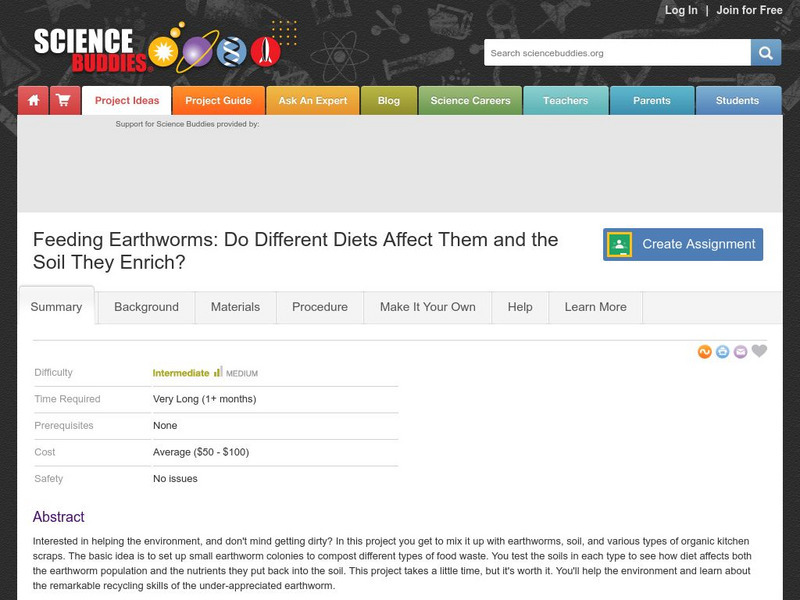Nuffield Foundation
Microscale Investigations of Catalase Activity in Plant Extracts
Use indirect measurements to monitor metabolic activity in plant cells. Scholars understand that cells with a higher metabolic rate have a higher concentration of catalase enzyme. They use this information to compare metabolic rates of...
Nuffield Foundation
Making a Streak Plate
Cultivate bacteria with a straightforward lesson featuring agar. Scholars create a streak plate on agar to ideally create colonies of bacteria or yeast that are growing separately from each...
Curated OER
Brine Date
Have you been wondering what to do with that aquarium full of brine shrimp? This activity has teens sea monkeying around with measurement, observations, and hypothesizing about the mating behaviors of these little critters. If you do not...
Nuffield Foundation
Biodiversity in Your Backyard!
Take your enthusiastic ecologists outdoors to explore the biodiversity right in their own schoolyard! In preparing for this activity, it may be worthwhile to research websites with local flora to help in the plant identification...
Curated OER
Investigating an Enzyme-controlled Reaction: Catalase and Hydrogen Peroxide Concentration
Are you looking for a way to measure cellular respiration? Try it with pureed potatoes. With some standard high school science equipment, biologists can perform an investigation and collect data surrounding byproducts of respiration. You...
Curated OER
Testing Leaves for Starch: the Technique
Like good scientists, kids often want to see first-hand why things are as they are; they can do just that in the starch-testing photosynthesis activity found here. Depending on the age of your pupils, you may wish to do the investigation...
Curated OER
Worm Compost & Vermicomposting
Learners explore vermicomposting, the species of worms needed and the proper climate for it. In this composting lesson students make their own worm compost bin.
Curated OER
Wiggley Worms
Students investigate how worms affect plant growth. In this biology lesson, students construct a worm ecosystem in a plastic 2 liter bottle and plant a seed in the soil. They later compare the ecosystems with worms to ones...
Curated OER
Forest Decomposition
Students explore decomposition. Students define and describe components of the decomposition process. Students make a composter in a terrarium. Students record observations and changes weekly, drawing conclusions about the results...
Curated OER
Food Chains
Fourth graders study food chains, producers, consumers, and decomposers. They play a food chain game and create food chain mobiles or posters. They take a nature hike around the school and observe various parts of a food chain.
Curated OER
Case of the Missing Pumpkin
Students explore the process of decomposition. In this science lesson, students carve a pumpkin and observe as it decomposes. Students compare the changes to an uncarved pumpkin. Students write about the disappearing pumpkin.
Curated OER
Science Writing
In this science writing worksheet, learners read about the details used in science writing such as facts, observations and conclusions. They answer 5 questions about paragraphs they read and they identify the differences between science...
Curated OER
Watering Soil
In this watering soil instructional activity, students complete a simple activity, following directions to use a watering can to sprinkle, pour slowly, then pour "faster" onto soil and write about what they notice. Teacher guide is on...
Curated OER
SEXUAL LIFE CYCLE DEVELOPMENT USING MONOCYSTIS
Pupils perform a lab to becoe familar with scientific concepts. The skill of inquiry is essential and this lesson furthers its development. The intelligence of kinesthetics is used as learners perform the many aspects of this lab exercise.
Curated OER
"Habitats"
Students complete a unit of lessons on animals and animal conservation. They observe a square meter of ground outside the school, set up a model environment, analyze an owl pellet, grow bread mold, and explore various websites.
Science Buddies
Science Buddies: How Diets Affect Earthworms and the Soil They Enrich
In this environment-oriented experiment, you will mix it up with earthworms, soil, and various types of organic kitchen scraps. The basic idea is to set up small earthworm colonies to compost different types of food waste. You test the...
Middle School Science
Lesson Plan: Earthworm Dissection
In this lesson plan site, you will "Learn the external and internal anatomy of the earthworm, understand the structure and function of external and internal organs, know the digestive, circulatory, reproductive, and nervous system, and...
PBS
Pbs: Dissection101: Dissection Resources for Classroom Use
A collection of lesson plans, quizzes, and educational videos developed for online dissections. The site hopes to improve the learning experience for students, and increase the quality of the dissection experience. Organisms included are...
SRI International
Performance Assessment Links in Science: Stimulus/response in Invertebrates
Students are given some guidelines to develop experiments to see how slugs or earthworms repsond to stimuli such as vinegar and light. This activity is designed to last 4 class periods.
Science Museum of Minnesota
Science Museum of Minnesota: Worms
This adaptable class project, developed by a first grade teacher, reveals the secret world of worms.
Museum of Science
Museum of Science and Industry: Online Science: Construct a Worm Farm
Clear instructions, with a photo of each step, explaining how to make a 'worm farm' in a large jar.



















